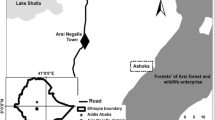Abstract
In this paper consideration is first given to how community forestry practitioners have commonly understood the term ‘participation’, and why the concept of ‘conflict’ does not seem to have overlapped with notions of ‘participation’. Failure to perceive conflict as inherent in participation is shown to have led to problems in implementation of community forestry programmes. The emerging awareness of conflict today is shown to be associated with the move away from community forestry in the form of village-based tree planting schemes towards community forest management, which involves devolution of state authority over natural forests. The paper presents a number of methods for managing conflict and discusses their strong and weak points. Using the experience of the introduction of ‘participation’ as a comparison, the paper considers the extent to which conflict management might be adopted as standard practice by forest agencies in community forestry. The paper concludes that because of the limited mandate of forest agencies, it is unlikely that they will be able to use conflict management tools to bring about social justice in forest conflict situations. However, the paper suggests that use of such tools could result in heightened awareness of the importance of conflict and in this way improve forest practice.
Similar content being viewed by others
References
Barraclough S and Ghimire K (1995) Forests and livelihoods: the social dynamics of deforestation in the developing countries. MacMillan Press, URISD International Political Economy Series
Biggs S and Smith G (1998) Beyond methodologies; coalition-building for participatory technology development. World Development, vol. 26, no. 2
Blench R (1997) Aspects of resource conflict in semi-arid Africa. ODI Natural Resource Perspectives, no. 16
Bressers JThA and Klok PJ (1988) Fundamentals for a theory of policy instruments. International Journal of Social Economics 15(3/4): 22-41
Cernea MM (1985) Alternative units of social organisation sustaining agroforestry strategies. In Cernea MM (ed) Putting people first: sociological variables in rural development. World Bank/Oxford University Press, Oxford
Cernea MM (1993) Strategy options for participatory reforestation: focus on the social actors. Rural Development Dialogue, vol. 14, no. 1
Chandrasekharan D (1996b) Addressing natural resources conflicts through community forestry: the Asian perspective. Paper presented at the e-conference 'Addressing natural resource conflicts through community forestry', FAO/FTP Programme, Jan-May 1996
Chandrasekharan, D (1996a) Proceedings electronic conference on 'Addressing natural resource conflicts through community forestry', Forest Trees and People Programme, Forestry Department, FAO, January-May 1996
Cleaver F (1998) Paradoxes of participation: a critique of participatory approaches to development. Paper presented at the conference 'Participation-The New Tyranny?', University of Manchester, November 3
Denis-Case D (1989) Participatory assessment, monitoring and evaluation. FAO Forests, Trees and People Programme, Community Forestry, Note 2
FAO (1985) Tree growing by rural people. FAO Forestry Paper, no. 64
FAO (1994) The community toolbox: the idea, methods and tools for participatory assessment, monitoring and evaluation in community forestry. Forests, Trees and People Programme, Community Forest Field Manuals Series no. 2
Forests, Trees and People Programme (1998) Integrating conflict mangement considerations into national policy frameworks. Proceedings of a satellite meeting to the XI World Forestry Congress, October 10-13, 1997, Antalya, Turkey
Gregersen H, Draper S and Elz D (1989) People and trees: the role of social forestry in sustainable development. World Bank, Economic Development Institute, Seminar Series
Grimble RJ, Aglionby J and Quan J (1994) Tree resources and environmental policy: a stakeholder approach. NRI Socio-economic Series no. 7. Natural Resources Institute, Chatham, UK
Hildyard N, Hegde P, Wolvekamp P and Reddy S (1998) Pluralism, participation and power. Forests, Trees and People Newsletter no. 35
Hobley M (1996) Participatory forestry: the process of change in India and Nepal. ODI, Rural Development Forestry Study Guide no. 3
Hoskins M (1986) Participatory action research information gathering methods. East-West Center, Hawaii
Khan NA (1996) Of Murubbi and Kamla: Patronage and social forestry in Bangladesh. University of Wales, Centre for Development Studies, Swansea
Long N (1990) From paradigm lost to paradigm regained: the case for an actor oriented sociology of development. European Review of Latin American and Caribbean Studies 49: 3-24
Mosse D (1998) The making and marketing of participatory development: a sceptical note. Paper presented at the conference 'Participation-The New Tyranny?', University of Manchester, 3 November
Muam CA (1999) Collaborative forest management in Cameroon: towards compatibility of government policy with indigenous culture. PhD thesis, Technology and Development Group, University of Twente, forthcoming
Musch A (1998) Making and circumventing tyranny. Paper presented at the conference 'Participation-The New Tyranny?', University of Manchester, November 3
Odhiambo MC (1996) Addressing natural resource conflicts through community forestry: the case of Eastern Africa. Paper presented at the e-conference 'Addressing Natural Resource Conflicts through Community Forestry', FAO/FTP Programme, January-May 1996
Pendizich C, Thomas G and Wohlgenan T (1994) The role of alternative conflict management in community forestry. FAO: Forests, Trees and People Programme, Working Paper no. 1
Röling N and Jiggins J (1998) The soft side of land: installment. In: Proceedings of the seminars on co-management in the forest context, September 23-October 5, Wageningen, International Agricultural Centre
Sarin M (1997) Integrating gender and equity sensitive conflict management in community forest policies. Paper presented at the satellite meeting 'Integrating conflict management considerations into national policy frameworks' of the World Forestry Congress, Antalya, Turkey, October 10-13
Schulyer N (1995) Coercive harmony: an anthropologist and a former federal judge debate the purpose of mandatory ADR. California Lawyer, May 1995
Shah P and Shah MK (1995) Participatory methods: precipitating or avoiding conflicts? IIED: PLA Notes, no. 24
Shepherd G (1986) Forest policies, forest politics. ODI Social Forestry Network Paper 3a
Sims D (1997) Negotiating a sustainable future for land. Land and Water Development Division, FAO, Rome
Skutsch MM (1983) Why people don't grow trees: socio-economic impacts of existing woodfuel programs, village case studies. Resources for the Future, Discussion Paper D-73
Skutsch MM (1994) Social forestry as sustainable development: comparative strategies in Sri Lanka. University of Twente, PhD Thesis
Taylor G and Johansson L (1996) Our voices, our words and our pictures. Plans, truths and videotapes from Ngorongoro Conservation Area. Forest, Trees and People Newsletter no. 30
Traore S and Lo H (1996) Natural resource conflicts and community forestry: a West African perspective. Paper presented at the e-conference 'Addressing natural resource conflicts through community forestry', FAO/FTP Programme, January-May 1996
Villareal C (1996) Socio-environmental and community forestry conflicts in Latin America. Paper presented at the e-conference 'Addressing Natural Resource Conflicts through Community Forestry', FAO/FTP Programme, January-May 1996
Warner M. and Jones P (1998) Assessing the need to manage conflict in community-based natural resource projects. ODI Natural Resource Perspectives no. 35
Author information
Authors and Affiliations
Rights and permissions
About this article
Cite this article
Skutsch, M.M. Conflict management and participation in community forestry. Agroforestry Systems 48, 189–206 (2000). https://doi.org/10.1023/A:1006328403023
Issue Date:
DOI: https://doi.org/10.1023/A:1006328403023




